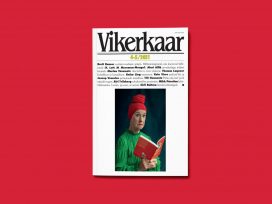‘Blätter’ takes a critical look at mass appeal with: Vidya Krishnan on the COVID-19 fallout after high attendance at India’s religious festival; the pressure of viewing figures on public broadcasting; and nationalism’s hold on popular sporting events.
The real body beautiful
Vikerkaar 4-5/2021
Communism’s centennial abyss
Index on Censorship 1/2021
Understanding money
Czas Kultury 1/21
Subscribe to our weekly newsletter
When India’s COVID-19 count rose from 1,863 to 35,864 cases in just 25 days earlier this year, the fallout quickly turned into a humanitarian crisis. Journalist Vidya Krishnan’s assessment in Blätter holds prime minister Narendra Modi primarily responsible: ‘Modi’s Hindu-nationalist government has taken the difficult task of organising a pandemic response in a poor country like India and made it impossible.’ And, as if this wasn’t damning enough, Krishnan points to Modi’s large-scale election rallies and his endorsement of the Maha Kumbh, the weeks-long Hindu religious festival, as triggers for super-spreader events.In its attempt to retrospectively contain the virus, the government implemented a draconian colonial-era law. Rather than controlling and treating the disease, authorities concentrated on curtailing civil liberties. India’s response, in Krishnan’s opinion, was a collective ‘moral failure’ that only gained ground because Indian society is still based on a caste system: ‘we have … made a Faustian bargain in signing up to hate our own neighbours, friends and colleagues.’

Public broadcasting at a crossroads
Having spent almost five years as a member of the West German Broadcasting Council, sociologist Robert Krieg provides an insider’s view on the future of German public broadcasting. Since the country’s introduction of privately funded television and radio in the mid-1980s, public provision has taken up a competitive counter position.
Krieg quotes Jürgen Habermas as an alternative pitch: ‘When it comes to gas, electricity or water, the state has an obligation to ensure the energy supply for the population. Shouldn’t it have a similar obligation when it comes to supplying this other type of ‘energy’, whose interruption causes disruptions harmful to the democratic state itself?’
Treating audiences as consumers rather than citizens is, in Krieg’s opinion, a grievous error. Within a neoliberal market, viewing figures often determine future programming. The result is easily consumable, even banal content, which replaces debate and analysis: ‘To avoid jeopardizing financing, … [public broadcasting] orients its offers … closely to supposed demand, which further trivializes programming.’ The next step is embedding specially produced content in social channels where niche audiences gather. Krieg considers public broadcasting is at a crossroads and should not lose sight of its democratic responsibility to provide an enlivening service.
The autocrats and nationalists behind football
The sixteenth European football championship, postponed due to the corona pandemic, has finally kicked off. Behind the glamour of Euro2020, billed as a symbol of peace, human rights, plurality and international understanding, lies the usual corruption and scandal. Sports journalist Ronny Blaschke reveals the deep entanglements between football and nationalist politics.
World sporting events intrinsically emphasize national allegiance. With various leaders such as Orbán, Putin and Erdoğan investing heavily in megaevents to gain populist points for political gain, the ultimate winners of match rivalry and off-pitch fanaticism are clear. ‘Try not to be taken in by the much-trumpeted commitment to human rights and a multicultural society’, writes Blaschke, ‘at this European Championship, many organizers will be putting their own nationalism first.’ Read Blaschke’s piece in Eurozine.
This article is part of the 10/2021 Eurozine review. Click here to subscribe to our weekly newsletter to get updates on reviews and our latest publishing.
Published 16 June 2021
Original in English
First published by Eurozine
© Eurozine
PDF/PRINTNewsletter
Subscribe to know what’s worth thinking about.
Related Articles

Touted as Europe’s largest infrastructure project, the Grand Paris Express promises better connectivity and improved public transport for the French capital. However, for Roma squatters and slum residents, the colossal project has meant forced evictions and further exclusion from society.

Faster, higher, stronger
Esprit 6/2024
On Olympic ideals and real-world interests: who benefits from the IOC’s policy of apoliticism? Republican games: On France’s hope for a ‘new national narrative’. Capitalist games: ‘Faster, higher, stronger’ as the watchword of the global city.








